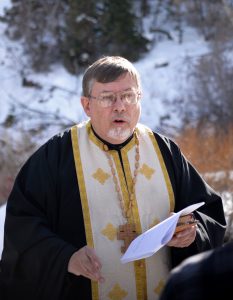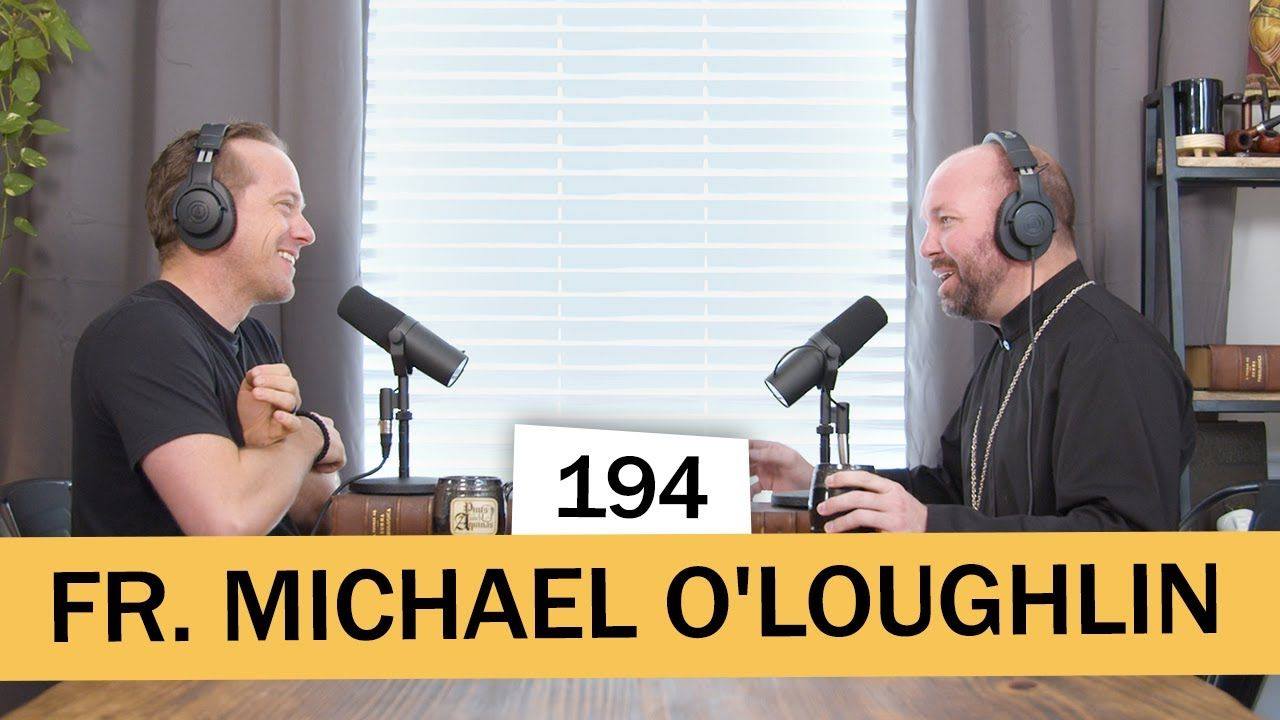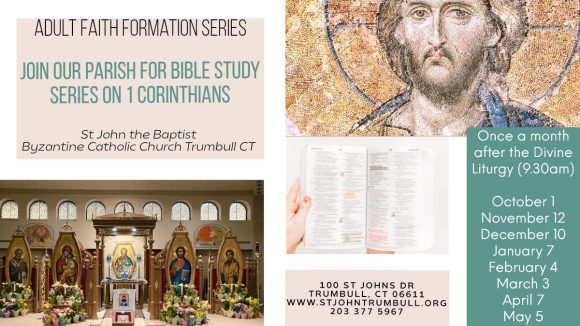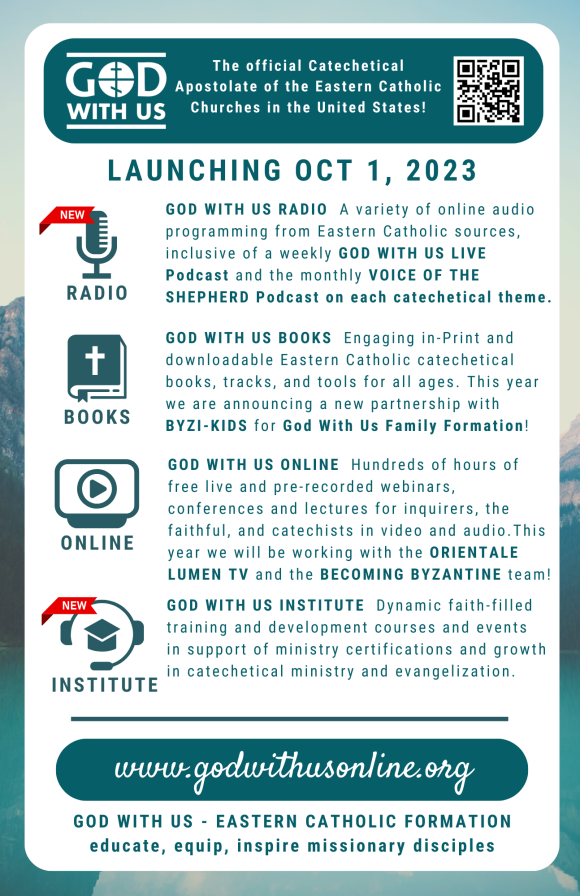All are welcome.
Tag: Adult Faith Formation
Resources for your faith development
Sacred Signs: Pointing the Way to Heaven
Many Christians tend to think of the spiritual life as something entirely opposed to physical reality. This can translate into Christian practice today in the form of plain churches and simple services, especially among Protestant denominations.
In contrast, apostolic Christianity is incarnational and sacramental, incorporating many physical things into worship: not just in the art and music accompanying the liturgy, but in the very liturgy itself we make use of fire and water, bread and oil, gestures and postures. Are these merely relics of a more religious era, or does the Church recognize there is something fundamental to our human nature that needs such signs and symbols?
This Tuesday, Fr. David Anderson will explore the meaning of the “stuff” of our Christian practice in order to restore a sacramental vision in our secular age.
SACRED SIGNS: Pointing the Way to Heaven
Tuesday, July 12
8:00 pm ET / Pre-class discussion 30 minutes prior
 About the Instructor
About the Instructor
Father David Anderson is a priest of the Ukrainian Catholic Eparchy of Chicago and has served as a parish priest for 37 years. He is also a published translator of patristic texts and Byzantine liturgical texts. For over 40 years, he has presented many classes on liturgy and the Church Fathers throughout the country, but especially in northern California. He is presently the Byzantine-rite chaplain at Wyoming Catholic College.
Third Sunday after Pentecost
“Therefore I tell you, do not be anxious about your life.” Only after Jesus has shown the hurt to be unspeakable, then and not before does he make the instruction stricter. He not only asks us to cast away what we have but also forbids us to take thought even for the food we need, saying, “Take no thought for your life, what you shall eat,” not because the soul needs food, for it is incorporeal. He spoke figuratively. For though the soul as such needs no food, it cannot endure to remain in the body unless the body is fed. (St. John Chrysostom)
As always, God With Us Online, there are several things to help us go deeper in knowing and following the Scripture we hear at the Divine Liturgy. So, at the link above for the resources there is a very brief piece on the Domestic Church (the church at home) by Melkite Deacon Thomas Moses. Most importantly listen to the Gospel reflection.
Parish Mission 2021 Part II
On Saturday, March 27, at the 9:00 a.m. Divine Liturgy we will have part II of the Parish Mission given by Father Gregory Lozinskyy, pastor of St. John the Baptist Byzantine Catholic Church, Trumbull. Father Gregory will preach in both Ukrainian and English.
Part I of the parish mission happened at last Sunday’s 10:30 a.m. Liturgy.
What Are The Eastern Rite Catholic Churches?
This is an episode of “The Catholic Talk Show,” talking with Fr. Elias Rafaj of the Ruthenian Church discussing the Eastern Catholic Churches attending to the similarities and differences with the Latin Catholic Church.
Highly recommended as part of your adult faith formation.
Spiritual Resources for this time
Talking serious theology
 New Episode from Matt Fradd! I talk with Byzantine priest and co-host of Catholic Stuff You Should Know, Fr. Michael O’Loughlin about the Eastern Catholicism, Eastern Orthodoxy, the Filioque, and much, much more.
New Episode from Matt Fradd! I talk with Byzantine priest and co-host of Catholic Stuff You Should Know, Fr. Michael O’Loughlin about the Eastern Catholicism, Eastern Orthodoxy, the Filioque, and much, much more.
Listen here: https://buff.ly/2Vn5WHF
Does God really change you?
Often we can take the designation ‘child of God’ as a metaphor, as a nice thought, but not something that reaches down to our very core. Yet the communion that Jesus invites us into is no metaphor, but a reality that changes our inner landscape. In Jesus, we become part of his risen body, sharing his inheritance as sons and daughters of God. (NS)
The Sunday Before Christmas: The Genealogy of Jesus
![]() The Gospel this Sunday presents us with an abundance of names, all those who were the ancestors of Christ. By this we see that on this feast, the Son and Word of God becomes a part of the human family and a part of human history. In this Gospel Jesus is also given a name, the final verse tells us that the child will be known as Jesus – Savior. In verse 22, though, he is given the name “Immanuel,” “God with us.” This gives us the theological meaning of the feast, the incarnation signifies our deification.
The Gospel this Sunday presents us with an abundance of names, all those who were the ancestors of Christ. By this we see that on this feast, the Son and Word of God becomes a part of the human family and a part of human history. In this Gospel Jesus is also given a name, the final verse tells us that the child will be known as Jesus – Savior. In verse 22, though, he is given the name “Immanuel,” “God with us.” This gives us the theological meaning of the feast, the incarnation signifies our deification.
We all have names, but for the ancients, names had meanings, they did not simply give us an identification tag, but told us something of who we were. In that sense, we do not name ourselves, but we are given a name, we are all “called by name” by God, and so we enter into the ancestry of Jesus. The names are the forefathers of Jesus, but also the foremothers are mentioned: Tamar, who bore a son by trickery of Judah; Ruth, the grandmother of David, who left her people to follow Naomi; the unnamed wife of David, Bathsheba, who David married by arranging for the death of Uriah. We see, then, that even trough questionable and evil actions, as well as by faithfulness, Jesus becomes “the son given to us.” The greatest of the woman in his genealogy is, of course, Mary, his mother, who by her obedience cancelled the curse of Eve, and united God with humanity in her womb.
Today, we celebrate the Son of Abraham, according to the Law, and the Son of David, the everlasting King, to whom even David bowed, and even the Son of exile, for we are all citizens of the spiritual, not the earthly, Jerusalem. Today we must be named as a follower of Christ.
Meditation by Archpriest David Petras
#ByzantineCatholicNewHaven
#ByzantineCatholicCT
#ByzantineCT


